Publications
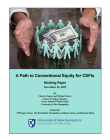
November 16, 2022
In this working paper, authors Charles Tansey and Michael Swack outline a path to conventional equity for CDFIs.
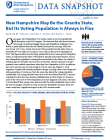
October 25, 2022
In this data snapshot, authors Kenneth Johnson, Andrew Smith, and Dante Scala discuss changes in the New Hampshire voting population since 2016 and its implications for the 2022 mid-term election.
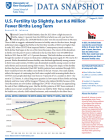
August 9, 2022
In this data snapshot, Carsey Senior Demographer Kenneth Johnson reports that National Center for Health Statistics data for 2021 show a slight increase in births, rising 1.5 percent from the 2020 level which was a 40-year low.

June 22, 2022
The Carsey School of Public Policy Federal Budget Quiz #1 is a game to familiarize you with the fun facts that you can find in our FedGovSpend Explorer App.
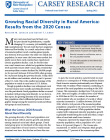
May 25, 2022
In this brief, authors Kenneth Johnson and Daniel Lichter report that although population declines were widespread between 2010 and 2020, rural America became more racially and ethnically diverse.
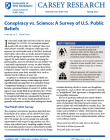
April 25, 2022
In this brief, author Lawrence Hamilton reports the results of a nationwide U.S. survey that asked respondents whether they agreed, disagreed, or were unsure about a series of statements that mixed pseudo-science conspiracy claims with well-established scientific facts.
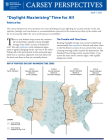
April 7, 2022
Should we keep Daylight Savings Time or leave it behind forever? Perhaps all of the participants in this perennial argument have a common opponent: not each other, but the time zone lines as they are currently drawn.
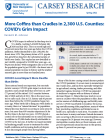
March 24, 2022
In this brief, Carsey Senior Demographer Kenneth Johnson reports that COVID’s impact is reflected in the sharp rise in U.S. deaths, reaching 3,434,000 between July 2020 and July 2021. This is a record high and 20 percent more than two years ago before the COVID pandemic.
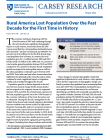
February 22, 2022
In this brief Carsey Senior Demographer Kenneth Johnson examines rural demographic trends between 2010 and 2020 using data from the 2020 Census. With fewer births, more deaths, and more people leaving than moving in, rural America experienced an overall population loss for the first time in history.
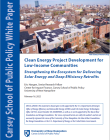
February 16, 2022
Scaling clean energy in low-income communities through solar and deep efficiency retrofits presents financing challenges, but that is only part of the problem. Drawing on research conducted by the Carsey School’s Center for Impact Finance, this white paper outlines a road map depicting the ecosystem needed to deliver clean energy projects to underserved communities.
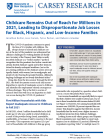
December 23, 2021
Using data from the late summer through the fall of 2021, this brief documents recent racial and income disparities in reports of inadequate access to childcare and identifies the employment-related consequences of these shortages.
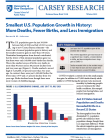
December 21, 2021
In this brief, author Kenneth Johnson reports that the U.S. population grew by just 393,000 between July of 2020 and July of 2021 according to new Census Bureau estimates—the lowest rate of annual population gain in history and the smallest numeric gain in more than 100 years.

October 22, 2021
This report provides an update on state by state the pandemic employment situation through September 2021. Every state is on the economic mend from 2020’s pandemic-induced collapse in employment, but the recovery has been uneven with some states returning to pre-pandemic levels of employment and others having recovered fewer than half of the jobs they had in February 2020.
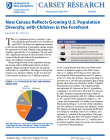
October 6, 2021
The U.S. population grew by a modest 7.4 percent during the past decade to 331.4 million in April 2020. There was a significant increase in racial diversity over the course of the decade, both in the population as a whole, and children in particular.
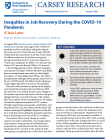
September 15, 2021
This policy brief provides an update on the employment trends that took place between February 2020 and June 2021.
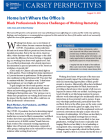
August 31, 2021
In this perspectives brief, authors John Jones and Jordan Hensley report the results of a survey that asked participants their perspectives on working from home and the impact that the death of the office could have on Black professionals’ opportunities.
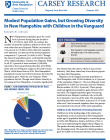
August 30, 2021
In this brief, author Kenneth Johnson reports that New Hampshire’s population grew by a modest 4.6 percent during the past decade to 1,377,500 in April 2020. In contrast, the number of minority residents, defined as those who were other than non-Hispanic Whites, increased by 74.4 percent to 176,900 in 2020.

August 20, 2021
Archived report through July 2021: With the strongest national job growth yet in 2021 and 38 states seeing statistically significant employment increases, July continued recent encouraging trends for the country’s economic trajectory. Despite this, all but two states are still short of their February 2020 employment levels. Nationally, payroll employment is still down 5.7 million jobs—a 3.7…
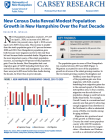
August 12, 2021
In this fact sheet, author Kenneth Johnson reports that New Hampshire’s population reached 1,377,529 on April 1, 2020, an increase of 61,000 residents (4.6 percent) since April 1, 2010 according to new 2020 Census data.
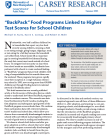
August 10, 2021
In this brief, authors Michael Kurtz, Karen Conway, and Robert Mohr summarize their recently published article at the Economics of Education Review, which aimed to understand how BackPack Programs relate to academic success.